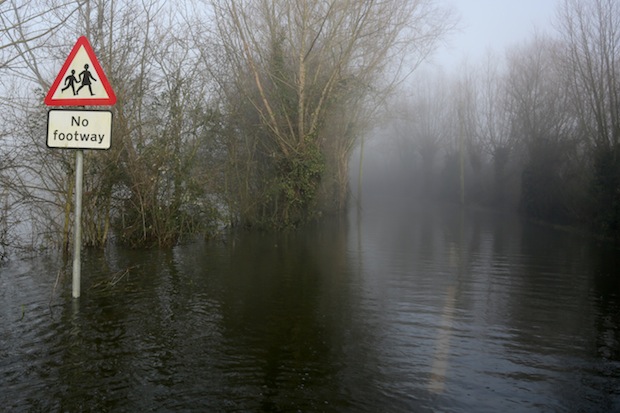Listen
There is nothing inevitable about the by now familiar sight of residents being towed away from flooded homes, of shops and businesses submerged, and all the misery and economic turmoil which follows. A short hop across the North Sea is a country which has been having much the same weather as we have recently and has even more low-lying land vulnerable to flooding. Yet there has been a remarkable lack of footage of Dutch homeowners being forced to gather their possessions and flee their homes. Why?
After a devastating storm surge in 1953, the Dutch made huge investments in engineering their land to prevent flooding. Vast dykes have been constructed, beaches regularly recharged with sand and shingle. Water management is carefully built into every development. Sea defences are of a standard required to protect against the kind of flooding event which might be expected once every 10,000 years; river defences to a one in 1,250-year standard. Britain can only dream of such protection: here, the corresponding figures are one in 200 and one in 100 years.
We did spend money on flood defences in the wake of the 1953 North Sea floods, culminating in the completion of the Thames Barrier in 1982. Then something went terribly wrong. As Christopher Booker explains on pages 14 and 15, rather than preparing for floods, government policy began to revolve around trying to will them away. Countless millions have been spent trying to avert climate change — a fool’s errand, driven by blind ideology rather than a level-headed approach to make a difference. Yet precious little has been spent on trying to build resilience to the increased rainfall and rising sea levels of which ministers endlessly forewarn.
It is as well that David Cameron this week declared that ‘money is no object’ in recovering from the floods. Until now his government, like its Labour predecessor, has spent grudgingly on flood defence. The blame does not only lie with the Environment Agency: George Osborne cut the flood defence budget when he became Chancellor, condemning 294 schemes which had already been planned. It is now just one quarter of the amount spent in England on subsidising green energy.
A defeatist attitude prevails: the Environ-ment Agency is always talking about retreating and abandoning land to the water — even though those landscapes have been successfully drained for centuries. The problem is partly to do with metropolitan fantasies about the sanctity of Mother Nature, but it is also a question of finance. It was Gordon Brown who decided to halve infrastructure spending, in the hope of protecting the voter-sensitive departments like schools and the NHS. This was short-term saving but long-term folly. It made it more likely that incredibly expensive disasters would strike further down the line. It is to Osborne’s discredit that he did not reverse Brown’s decision.
This magazine is in favour of a small state, not of a weak state. There are certain things which by their very nature must be organised on a collective basis. A sea wall is only as good as its weakest link. We cannot entrust flood defences to individual property owners any more than we can trust the military defence of the country to citizens with their own weapons.
These are both core activities of a proper functioning state, and yet both have been scaled back so that tax revenues might instead be fed to the voracious beast of social and cultural programmes: things with which governments have only relatively recently become involved.
It is a similar story with sanitation. For more than a century, emptying the bins was accepted as a core function of public authorities. Now they try to wriggle out of it, reducing the frequency of collections and trying to levy spurious charges on householders who produce what officials consider to be excess waste — even though, of course, one of the whole purposes of the rates, the forerunner of council tax, was to fund waste disposal. Mending the roads, too, used to be an accepted duty of public authorities, but has since been downgraded as councils find what they regard as more exciting ways to spend our money, leaving a trail of potholes the length and breadth of the land.
We will have learned nothing from the floods if their legacy is not a better focus by government on what should be core activities: overseeing the provision of essential public services. That’s not to say that all of these should be in public hands: many, such as telephone services and parcel deliveries, are now more efficient because private companies have been involved. But where competition is impossible, flood defence being a prime example, we need strong public authorities.
The Environment Agency is not such an authority. It is a hotpotch of competences, driven by personal agendas and environmental ideology. Unlike the sea wall at Dawlish in Devon, it does not deserve to be shored up. Rather, it should be dismantled and replaced with a flood defence agency whose staff are under no illusion as to their task: to protect people and property from inundation by river and sea. And yes, this is one public service which deserves a lot more cash.
A transfer of some of the money being frittered on wind farms and solar parks would be a good start.
Got something to add? Join the discussion and comment below.
Get 10 issues for just $10
Subscribe to The Spectator Australia today for the next 10 magazine issues, plus full online access, for just $10.
You might disagree with half of it, but you’ll enjoy reading all of it. Try your first month for free, then just $2 a week for the remainder of your first year.














Comments
Don't miss out
Join the conversation with other Spectator Australia readers. Subscribe to leave a comment.
SUBSCRIBEAlready a subscriber? Log in